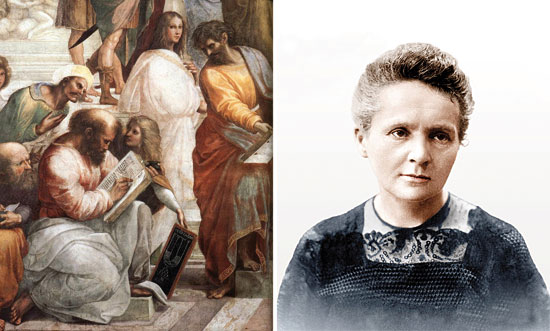The universalisation of human rights dissolved the male monopoly of education, culture or science, and allowed women to get involved in these for the first time (FOTO: Miguel Lorenzo)
VALENCIA. What epitomises patriarchal society since Antiquity is the male-dominated power structure, both in social and individual relationships. Power belonged to and was transmitted through men, who were head of the family as well as the political and religious leaders. In short, in this social system, authority and power are transmitted through the male lineage and patrilineal descent, while women, children, goods and properties are subordinates.
In our tradition, the counterpoint to this singling out of man, with his leading role in public life, society, politics, art, war, science and culture, is the exclusion of woman; in other words, her «domestication», domestic reclusion, responsibility for the household economy (oikos), taking care of children, animals and domestic orderliness. The legitimisation of social order has deep ideological roots, such as the defi nition of nature as a construct of reality in terms of polarity: male/female; day/night; good/ evil; virtue/sin; light/dark... or Antiquity's «natural philosophies», which created archetypes of masculinity and femininity, in harmony with the patriarchal social order.
Meanwhile, in Hellenic tradition, the most infl uential thinkers like Aristotle, Plato or Galen constructed biological arguments based on the physiological inferiority of females: mas occasionatus, in other words, the female is an unfi nished male according to Aristotle, and woman's psychological and moral virtues made her inferior, doomed to home, motherhood and male domination. Indeed, social order was required to be consistent with natural order, and was further legitimised by sacred or religious order. Galen's humoralism, steeped in Aristotelianism, spread a doctrine of temperaments according to which masculine humour was characterised by strength, intelligence, action, and a constructive spirit, while the female humour was identified with sensitivity, affection, materiality, passivity; namely qualities, moods and temperaments that relegated females to the domestic role of motherhood.
Monotheism and misogyny
Biological and social inferiority of women was defi nitively reinforced in our cultural tradition by spiritual inferiority. The transition from polytheism, which was more or less compatible with natural philosophy, to «patriarchal monotheism» supported women's subordination to men even more than before. Christianity, Judaism and Islam share deeply misogynist religious roots, an essential part of their dogma.
Christian anthropology claimed by some as the true hallmark of Western Europe, established in the early councils that illuminated Patristics, along with the ideas of Paul of Tarsus and Augustine of Hippo, not only the spiritual inferiority of women, but they also deprived her of a soul, an essential element of the human condition, calling into question women's spiritual identity and right to salvation. Modernity was to witness many theological debates before women -always considered humanly and spiritually inferior- were to receive some recognition of human spirituality owing to Mary, the mother of Christ.

When females sought an existence outside the purely domestic ambit, then they became a destabilising and subversive factor. This was Hypatia's case (on the left), mathematician and astronomer from the 4th century considered the first woman scientist, or Marie Curie's (on the right), chemist and physicist, who was awarded two Nobel prizes for her pioneer work on radioactivity. (FOTO: Mètode
)
It is no coincidence that all patriarchal mythologies portray women -be they called Eve or Pandora- in disgrace, as the source of evil, sickness, pain and death. Women were depicted as curious and fi ckle, sensitive, and of limited intelligence. Women were guilty of breaking the sacred order established by God the Father; they were sinful, seductive, evil incarnate. Patriarchal power in classical societies was based on a solid understanding of the human condition, legitimised by religious, philosophical and biological elements that contributed certain coherence to the physiological, social and spiritual inferiority of women compared to men.
Demoted to a condition of inferiority, contact with a female would always diminish and endanger male perfection, be it in the spiritual or physical dimension. So it was some doctors saw women as bearers of disease (venereal), a risk, while priests saw them as a threat to spiritual perfection, a reason for celibacy. Patriarchal monotheistic religions have viewed women from the perspective of fear and danger.
A woman's status as an individual, social, intellectual and spiritual entity has traditionally been hidden behind subordination to male dominance and sacred patriarchal order. When females sought an existence outside the purely domestic ambit, then they became a destabilising and subversive factor. Some examples are Hypatia during Antiquity, Oliva Sabuco during the Renaissance; or Marie Curie in contemporary society, to which we must also add the numerous witches, healers, midwives and abortionists who fell victim of judges, physicians or inquisitors -all instruments of patriarchal power-, and prey to the taste of torture and bonfi re fl ames from the anonymity of history.
Science under the patriarchal order
Dating from the natural philosophies wrought during Antiquity, Science -in other words, knowledge of nature and its laws built up from secular rationality- belonged solely to masculine and aristocratic elites, that is, linked to the nobility and religious hierarchy. Knowledge, be it theological, philosophical or scientific, was the heritage of powerful groups. Moreover, knowledge has historically been an instrument of domination and perpetuation, as well as a source of confl ict between dominant social groups at times.
The knowledge regime corresponding to each society in each epoch reflects the intellectual and social order, the players, dynamics and scientific practices can only be understood within the historical context, bearing in mind the inseparable universe comprising the knowledge regime and social dynamics. Historically, at this intersection of knowledge and power, women were not to be found; indeed, they were most conspicuously absent. (Full text available at Mètode's website).
__________________________________________________________________________
*Josep Lluís Barona. Full Professor of History of Science at the University of Valencia
Noticias relacionadas
 AVISO DE COOKIES: Este sitio web hace uso de cookies con la finalidad de recopilar datos estadísticos anónimos de uso de la web, así como la mejora del funcionamiento y personalización de la experiencia de navegación del usuario. Aceptar
Más información
AVISO DE COOKIES: Este sitio web hace uso de cookies con la finalidad de recopilar datos estadísticos anónimos de uso de la web, así como la mejora del funcionamiento y personalización de la experiencia de navegación del usuario. Aceptar
Más información


 imprimir
imprimir meneame
meneame

 whatsapp
whatsapp
